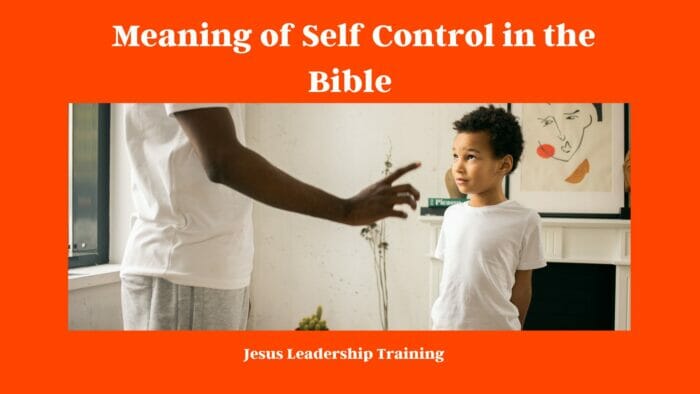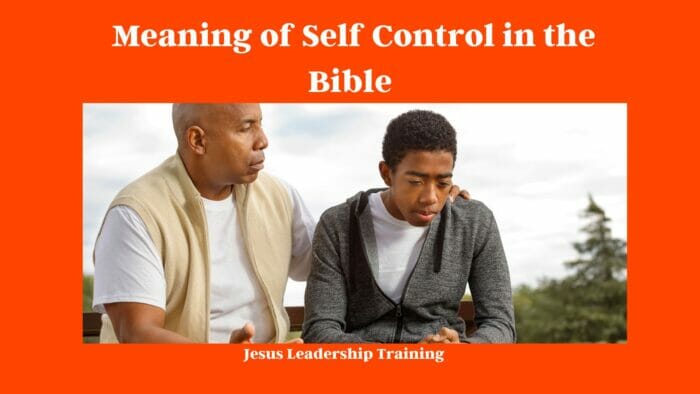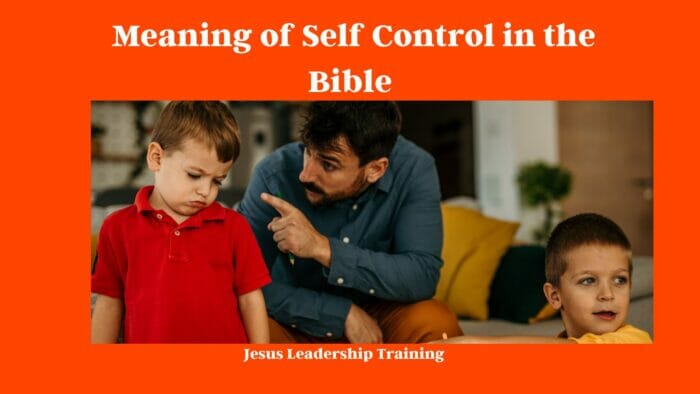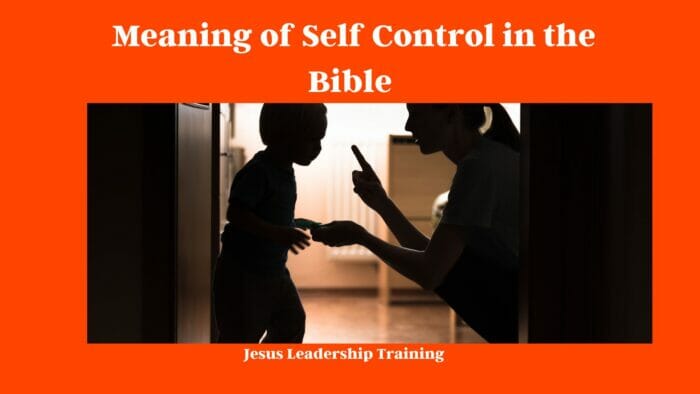Self-control is an important virtue emphasized in the Bible. It refers to the ability to restrain oneself, exercise discipline, and make choices that align with God’s principles. In this article, we will explore the meaning of self-control in the Bible, its significance, examples from scripture, the rewards it brings, how to develop it, and the role of the fruit of the Spirit in cultivating self-control. Meaning of Self Control in the Bible
Table of Contents
Definition of Self Control : Meaning of Self Control in the Bible
Self-control, as defined in the Bible, is the ability to master one’s desires, emotions, and actions, enabling individuals to live in obedience to God’s commandments. It involves reigning in impulsive behavior, resisting temptation, and exhibiting discipline in various aspects of life, such as speech, thoughts, and actions.
Importance of Self Control in the Bible
Self-control is highly regarded in the Bible due to its transformative power. It allows believers to align their lives with God’s will and helps them overcome sinful inclinations. Through self-control, individuals can live a life that is pleasing to God and serves as a witness to others.
Examples of Self-Control in the Bible
4.1 Self-Control in the Old Testament
In the Old Testament, we find numerous examples of individuals who demonstrated self-control. Joseph, when faced with the seduction of Potiphar’s wife, resisted temptation and remained faithful to God. Daniel, in the face of King Nebuchadnezzar’s decree, maintained his devotion to God and refused to compromise his faith. These stories highlight the importance of self-control in preserving one’s integrity and loyalty to God.
4.2 Self-Control in the New Testament
The New Testament also presents compelling examples of self-control. Jesus, during His ministry, exhibited self-control in the face of adversity and temptation. He resisted Satan’s offers in the wilderness and remained steadfast in fulfilling God’s purpose. The apostle Paul, known for his strong character, emphasized the significance of self-control in his teachings, encouraging believers to exercise discipline and live according to the Spirit.

The Rewards of Self-Control
Self-control yields numerous rewards both in this life and the eternal realm. It enables individuals to experience inner peace, maintain healthy relationships, and avoid the consequences of impulsive actions. In addition, self-control is linked to the development of other virtues such as patience, kindness, and faithfulness, leading to a more abundant and fruitful life.
9 Things a Christian Needs to Exercise Self Control over
- Desires: A Christian needs to exercise self-control over their desires and impulses, as stated in Proverbs 16:32: “Better a patient person than a warrior, one with self-control than one who takes a city.”
- Thoughts: A Christian needs to exercise self-control over their thoughts, as stated in 2 Corinthians 10:5: “We demolish arguments and every pretension that sets itself up against the knowledge of God, and we take captive every thought to make it obedient to Christ.”
- Speech: A Christian needs to exercise self-control over their speech, as stated in James 1:19: “My dear brothers and sisters, take note of this: Everyone should be quick to listen, slow to speak and slow to become angry.”
- Anger: A Christian needs to exercise self-control over their anger, as stated in Ephesians 4:26: “In your anger do not sin: Do not let the sun go down while you are still angry.”
- Relationships: A Christian needs to exercise self-control over their relationships, as stated in 1 Thessalonians 4:3-4: “It is God’s will that you should be sanctified: that you should avoid sexual immorality; that each of you should learn to control your own body in a way that is holy and honorable.”
- Temptations: A Christian needs to exercise self-control over their temptations, as stated in 1 Corinthians 10:13: “No temptation has overtaken you except what is common to mankind. And God is faithful; he will not let you be tempted beyond what you can bear. But when you are tempted, he will also provide a way out so that you can endure it.”
- Habits: A Christian needs to exercise self-control over their habits, as stated in Galatians 5:22-23: “But the fruit of the Spirit is love, joy, peace, forbearance, kindness, goodness, faithfulness, gentleness and self-control. Against such things there is no law.”
- Spending: A Christian needs to exercise self-control over their spending, as stated in Proverbs 21:20: “In the house of the wise are stores of choice food and oil, but a foolish man devours all he has.”
- Time: A Christian needs to exercise self-control over their time, as stated in Ephesians 5:15-16: “Be very careful, then, how you live—not as unwise but as wise, making the most of every opportunity, because the days are evil.”
Developing Self-Control
Developing self-control requires intentional effort and reliance on God’s strength. Prayer, meditation on Scripture, and seeking the Holy Spirit’s guidance are essential for cultivating self-control. Setting specific goals, avoiding triggers, and practicing self-discipline in small areas of life can gradually strengthen one’s self-control muscle.

“Jesus didn’t die on the cross so that we don’t have to. He died on the cross so that we may join him there.”
– Dallas Willard
5 Ways a Christian can develop Self Control
- Pray Regularly: Prayer is one of the most powerful weapons a Christian has in their arsenal. Spending time in prayer daily and focusing on God’s will can help a Christian develop self-control. Praying for strength and guidance will open the doors to a new level of self-control.
Verse: “Submit yourselves, then, to God. Resist the devil, and he will flee from you.” (James 4:7) - Read the Bible: One of the best ways for a Christian to develop self-control is to study and read the Bible. The Bible is full of wisdom and guidance and provides the perfect opportunity for a Christian to learn and grow in the areas of self-control.
Verse: “Let us throw off everything that hinders and the sin that so easily entangles. And let us run with perseverance the race marked out for us.” (Hebrews 12:1)
- Practice Self-Discipline: Self-discipline is an essential part of self-control. A Christian needs to practice self-discipline in order to stay focused on the task at hand and to resist temptations. Self-discipline is not easy but it is necessary in order to develop self-control.
Verse: “No discipline seems pleasant at the time, but painful. Later on, however, it produces a harvest of righteousness and peace for those who have been trained by it.” (Hebrews 12:11)
- Cultivate Healthy Habits: A Christian needs to cultivate healthy habits in order to develop self-control. This includes getting enough rest, eating healthy foods, exercising regularly, and avoiding unhealthy habits such as smoking and drinking.
Verse: “Do you not know that your bodies are temples of the Holy Spirit, who is in you, whom you have received from God? You are not your own; you were bought at a price. Therefore honor God with your bodies.” (1 Corinthians 6:19-20)
- Seek God’s Wisdom: Developing self-control is not easy but with the help of God’s wisdom, it is possible. A Christian should seek God’s wisdom and ask for guidance in developing self-control.
Verse: “If any of you lacks wisdom, you should ask God, who gives generously to all without finding fault, and it will be given to you.” (James 1:5)
Overcoming Challenges to Self-Control
Challenges to self-control are inevitable, but they can be overcome with perseverance and reliance on God’s grace. Identifying personal weaknesses, seeking accountability, and surrounding oneself with supportive communities are effective strategies. Additionally, renewing the mind through the study of God’s Word and aligning one’s thoughts with biblical truths can aid in overcoming challenges to self-control.
8 Steps the Bible Guides us to Take if we have Lost Self Control in Our Life
- Seek God’s Guidance: The Bible encourages us to “seek the Lord and his strength; seek his presence continually” (Psalm 105:4). When we are struggling with self-control, we should look to God for guidance and strength.
- Pray: Prayer is a powerful way to renew our spirit and connect with God. We should pray for the strength to resist temptation and the ability to make wise decisions. The Bible tells us to “pray without ceasing” (1 Thessalonians 5:17).
- Read the Bible: The Bible is filled with wisdom and guidance. We should read it regularly to strengthen our faith and learn how to live according to God’s will. In particular, the book of Proverbs provides wisdom and advice to help us gain and maintain self-control.
- Spend Time in Fellowship: The Bible encourages us to “encourage one another and build one another up” (1 Thessalonians 5:11). Spending time in fellowship with other believers can help us stay accountable and remember what it means to live in obedience to God.
- Avoid Temptation: The Bible tells us to “flee from sexual immorality” (1 Corinthians 6:18). We should do whatever we can to avoid situations that may lead to temptations. This may include avoiding certain people, places, or activities.
- Exercise Self-Discipline: We should strive to practice self-discipline in all aspects of our lives. This includes exercising control over our thoughts, emotions, and behavior. The Bible tells us to “discipline your son, and he will give you rest” (Proverbs 29:17).
- Spend Time in Nature: Spending time in nature can help us restore our sense of calm and peace. The Bible encourages us to “be still and know that I am God” (Psalm 46:10). Taking a walk in nature or watching a sunset can help us remember that God is in control.
- Seek Professional Help: If we are struggling to regain control of our lives, it is important to seek professional help. This could include counseling, therapy, or other forms of support. The Bible tells us to “seek wise counsel” (Proverbs 11:14).
The Fruit of the Spirit and Self-Control
The fruit of the Spirit, as outlined in Galatians 5:22-23, includes self-control. This suggests that self-control is not solely dependent on human effort but is a product of the Holy Spirit’s work in the believer’s life. By surrendering to the Holy Spirit and allowing His transformative power to work within, individuals can experience increased self-control and bear the fruit that brings glory to God.
The Bible is full of wisdom, and it provides us with a great source of inspiration and guidance. One of the key lessons it teaches us is the importance of self control. As believers, we are called to live a life that is pleasing to God, and self control is essential to that pursuit. In this blog, we’ll explore some of the Bible verses that talk about self control, learn God’s perspective on it, understand the power of the Holy Spirit in helping us to develop it, and discover how Jesus taught us to practice it. We’ll also examine the role of self control in the life of David, and discuss how prayer and obedience can help us cultivate it. Finally, we’ll appreciate the importance of self control in the Bible and how it can help us live a life that is pleasing to God.

Exploring Bible Verses on Self Control
The Bible is full of verses that speak of the importance of self control. Proverbs 16:32 says, “Better a patient person than a warrior, one with self-control than one who takes a city.” This verse emphasizes the power of self control in our lives and how it can be more beneficial than even the most impressive accomplishments. The book of Proverbs also includes other passages that speak of the importance of self control, such as Proverbs 25:28, which says, “Like a city whose walls are broken through is a person who lacks self-control.” This verse paints a vivid picture of the consequences of not having self control.
- Proverbs 25:28 – “Like a city whose walls are broken down is a man who lacks self-control.” This verse encourages us to exercise self-control, as it compares the need for self-control with that of a city’s walls, which protect it from adversities and danger. It also warns against the consequences of lacking such control, which is likened to a city without its walls.
- Galatians 5:22-23 – “But the fruit of the Spirit is love, joy, peace, patience, kindness, goodness, faithfulness, gentleness, self-control; against such things there is no law.” This verse from the New Testament emphasizes the importance of self-control as a fruit of the Spirit. It communicates the importance of self-control to a life of faith, as it is one of the nine fruits of the Spirit, and is listed alongside other virtues such as love, joy, and peace.
- 1 Peter 5:8 – “Be sober-minded; be watchful. Your adversary the devil prowls around like a roaring lion, seeking someone to devour.” This verse calls us to be watchful and be in control of our actions and emotions as the devil seeks opportunities to exploit our weaknesses. It encourages us to keep a close watch on ourselves and have self-control in order to resist temptations from the devil.
- Philippians 4:8-9 – “Finally, brothers, whatever is true, whatever is honorable, whatever is just, whatever is pure, whatever is lovely, whatever is commendable, if there is any excellence, if there is anything worthy of praise, think about these things. What you have learned and received and heard and seen in me—practice these things, and the God of peace will be with you.” This passage from the New Testament encourages us to practice self-control by thinking on positive and constructive thoughts. It calls us to focus on that which is pure, honorable, and true, and to practice these things, so that we will be able to maintain self-control and experience the peace of God.
Etymology of the Biblical Word Self Control
The concept of self-control is an important one in the Bible, which speaks of the need to exercise control over our own thoughts, words, and actions. But where did this concept first come from? Let’s take a look at the etymology of the Biblical word self-control, and explore its roots in the original languages of the Bible.
Origin
The concept of self-control is found throughout the Bible, but the earliest use of the term comes from the Greek Septuagint translation of the Old Testament, which dates to the late 2nd century BC. Here, the Greek word for self-control (egkrateia) is used to describe the need to exercise control over one’s passions and desires.
Hebrew
In the original Hebrew, the concept of self-control is expressed through the root word שפע (shapha), which means “to restrain” or “to govern” oneself. In the Bible, this word is used to describe the need to control one’s passions and desires, as well as to control one’s actions in general.
Greek
As mentioned above, the Greek Septuagint translation of the Old Testament was the earliest source to use the term self-control. In the Greek language, the concept of self-control is expressed through the root word ekrateia, which literally means “to have power over” or “to master.”
Aramaic
In the Aramaic language, the term self-control is expressed through the root word חכמה (chokhma), which literally means “wisdom.” This term is used to describe the need to exercise wisdom in controlling one’s thoughts, words, and actions.
In conclusion, the concept of self-control is an important one in the Bible, and its etymology can be traced back to the original languages of the Bible. Through the Hebrew root word שפע, the Greek term ekrateia, and the Aramaic word חכמה, the Bible speaks of the need to exercise control over our own thoughts, words, and actions.
Understanding God’s Perspective on Self Control
God has a very clear perspective on self control. He desires us to have it and He knows that it is essential to living a life that is pleasing to Him. In Galatians 5:22-23, we see a list of the fruits of the Spirit, and self control is included in that list. This shows us that God not only desires us to have self control, but He also provides us with the power of the Holy Spirit to help us cultivate it.
Discovering the Power of the Holy Spirit and Self Control
The power of the Holy Spirit is essential to developing self control. In Romans 8:5-6, we read, “Those who live according to the flesh have their minds set on what the flesh desires; but those who live in accordance with the Spirit have their minds set on what the Spirit desires. The mind governed by the flesh is death, but the mind governed by the Spirit is life and peace.” This passage shows us that the Holy Spirit helps us to have our minds set on what is pleasing to God and to live in accordance with His will.
5 Benefits of Self Control in Our Life
- Improved Decision Making: Self-control helps us to think before we act, weigh up the pros and cons of a situation, and make rational decisions. This is especially important in difficult or stressful situations, when it is easy to make rash decisions.
- Better Health: Self-control can help us to make healthier choices when it comes to our physical and mental well-being. It can help us to resist unhealthy cravings and stick to healthier diets, exercise regularly, and get adequate sleep.
- Improved Relationships: Self-control can help us to better manage our emotions and behavior in our relationships. This can help us to be more understanding, patient, and loving towards our partners and friends.
- More Success: Self-control can help us to stay focused on the tasks that need to be accomplished and resist distractions. This can help us to stay on track and achieve our goals.
- Greater Resilience: Self-control can help us to cope with stressful and challenging situations. It can help us to take a step back and view the situation objectively and calmly, and come up with a constructive plan of action.
Verse:
Colossians 3:23: “Whatever you do, do it from the heart, as something done for the Lord and not for people.”
This verse reminds us that it is important to do things with the right attitude and motivation, and not just for the sake of pleasing others. Self-control helps us to stay focused on our purpose and resist temptation. We can use it to stay motivated and do things out of genuine love and devotion for God, and not just to please those around us.
Learning from Jesus’ Teachings on Self Control
Jesus taught us many lessons about self control. In Matthew 5:48, He says, “Be perfect, therefore, as your heavenly Father is perfect.” This verse emphasizes the importance of striving to be like our heavenly Father in all aspects of our lives, including self control. Jesus also taught us the importance of forgiveness and self control in Matthew 18:21-22, when He says, “Then Peter came to Jesus and asked, ‘Lord, how many times shall I forgive my brother or sister who sins against me? Up to seven times?’ Jesus answered, ‘I tell you, not seven times, but seventy-seven times.’” This passage shows us that self control is a vital part of being able to forgive others.
5 Ways the Bible says that Jesus Displayed Self Control
- Philippians 2:8: Jesus humbled himself by accepting the form of a servant and was obedient to the point of death, even death on the cross (NIV). Here, Jesus demonstrated self-control by willingly submitting to God’s plan for his life, even when it meant facing the ultimate sacrifice.
- Matthew 4:1-11: In this passage, Jesus was tempted by the devil in the wilderness. However, Jesus refused to be swayed by any of the devil’s temptations, choosing instead to submit to the will of God. By refusing to give in to temptation, Jesus displayed self-control.
- Mark 11:12-14: In this passage, Jesus was angry when he saw that the temple was being used for commercial purposes. However, he controlled his anger and did not act out in a way that would be destructive. Instead, he simply cleared out the animals and overturned the tables. This showed that even when faced with a difficult situation, Jesus was able to remain in control.
- John 4:1-42: In this passage, Jesus encountered a woman at a well. He could have easily judged her, but instead he listened to her story and treated her with respect. His self-control enabled him to show compassion and mercy to a person who was looked down upon by society.
- John 18:1-11: In this passage, Jesus was arrested by the Roman soldiers. In the face of such a difficult situation, Jesus did not lash out or try to fight his way out of it. Instead, he calmly followed the soldiers and submitted to their authority. This showed great self-control and faith in God’s plan.
Examining the Role of Self Control in the Life of David
The life of David is a great example of the importance of self control. In 2 Samuel 11:1-5, we read about how David was tempted to commit adultery with Bathsheba, but he was able to resist the temptation and turn away from sin. This passage shows us the power of self control in the life of a believer and how it can lead us away from sin.

Cultivating Self Control through Prayer and Obedience
Prayer and obedience are essential for cultivating self control. In James 1:19-20, we read, “My dear brothers and sisters, take note of this: Everyone should be quick to listen, slow to speak and slow to become angry, because human anger does not produce the righteousness that God desires.” This passage shows us how important it is to be slow to speak and to be controlled in our emotions in order to be obedient to God’s commands.
Additionally, prayer is a great way to help us develop self control. In Philippians 4:6-7, we read, “Do not be anxious about anything, but in every situation, by prayer and petition, with thanksgiving, present your requests to God. And the peace of God, which transcends all understanding, will guard your hearts and your minds in Christ Jesus.” This passage reminds us that prayer can help us to find peace and control in our lives.
Appreciating the Importance of Self Control in the Bible
The Bible is full of verses that emphasize the importance of self control. In Titus 2:12, we read, “It teaches us to say ‘No’ to ungodliness and worldly passions, and to live self-controlled, upright and godly lives in this present age.” This verse reminds us that self control is essential to living a life that is pleasing to God. Additionally, in 1 Corinthians 9:25-26, we read, “Everyone who competes in the games goes into strict training.
They do it to get a crown that will not last, but we do it to get a crown that will last forever. Therefore I do not run like someone running aimlessly; I do not fight like a boxer beating the air.” This passage shows us that we must train ourselves in self control if we want to live a life that is pleasing to God and that will last forever.
Self control is an essential part of living a life that is pleasing to God. The Bible is full of verses that talk about the importance of self control and how to cultivate it. By exploring these verses, we can understand God’s perspective on self control, learn from Jesus’ teachings on it, examine the role of self control in the life of David, and appreciate the importance of it in the Bible.
Additionally, we can discover the power of the Holy Spirit in helping us to cultivate self control and cultivate it through prayer and obedience. Ultimately, self control is essential to living a life of faith that is pleasing to God.
Final Thoughts – Meaning of Self Control in the Bible
In conclusion, self-control holds great significance in the Bible. It involves restraining one’s desires and actions, aligning with God’s principles, and resisting temptation. By exercising self-control, believers can live a life that honors God, grows in virtue, and impacts others positively. Through prayer, reliance on the Holy Spirit, and intentional discipline, individuals can develop and strengthen their self-control, experiencing the transformative power of this virtue.
FAQs
Q1: How does self-control relate to other virtues in the Bible? Self-control is interconnected with other virtues such as patience, kindness, and faithfulness. It serves as a foundation for their development and enables individuals to consistently live out these virtues in their daily lives.
Q2: Can self-control be learned or is it solely a matter of innate disposition? While some individuals may have a natural inclination towards self-control, it is a virtue that can be cultivated and developed through intentional effort, reliance on God, and practice in various areas of life.
Q3: Are there any biblical warnings against lack of self-control? Yes, the Bible warns against the consequences of lacking self-control. Proverbs 25:28 states that a person without self-control is like a city broken into and left without walls, vulnerable to destructive forces.
Q4: How does self-control impact decision-making? Self-control plays a crucial role in decision-making as it allows individuals to pause, evaluate options, and choose actions that align with their values and God’s principles. It helps avoid impulsive and regrettable choices.
Q5: Is self-control only applicable to certain areas of life? No, self-control is applicable to all aspects of life. It extends to thoughts, emotions, speech, actions, and various areas such as relationships, finances, and personal habits. Practicing self-control holistically leads to a well-rounded and purposeful life.




